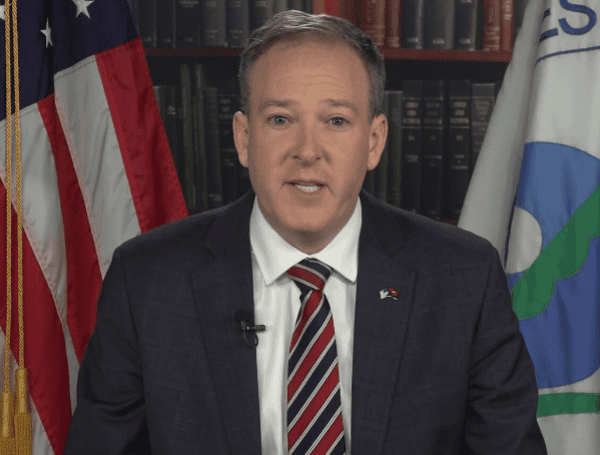In a move set to reshape the American energy landscape, U.S. Environmental Protection Agency (EPA) Administrator Lee Zeldin, alongside a coalition of Republican lawmakers and Navajo Nation President Buu Nygren, today announced two significant proposals aimed at repealing key Biden-Harris administration regulations impacting the power sector.
The EPA asserts that these repeals, if finalized, could save Americans more than a billion dollars annually and are crucial for ensuring affordable, dependable energy and restoring American energy dominance.
READ: Florida And Texas Vie For NASA Headquarters: New Space Race For Economic, Scientific Dominance
The proposed actions target “greenhouse gas” emissions standards for power plants under Section 111 of the Clean Air Act (CAA) and amendments to the 2024 Mercury and Air Toxics Standards (MATS). Administrator Zeldin stated that these Biden-era regulations have imposed “massive costs on coal-, oil-, and gas-fired power plants, raising the cost of living for American families, imperiling the reliability of our electric grid, and limiting American energy prosperity.”
“Affordable, reliable electricity is key to the American dream and a natural byproduct of national energy dominance,” said EPA Administrator Zeldin. “According to many, the primary purpose of these Biden-Harris administration regulations was to destroy industries that didn’t align with their narrow-minded climate change zealotry. Together, these rules have been criticized as being designed to regulate coal, oil and gas out of existence.”
READ: New York Rep. AOC Rips Dems: Stop Answering For “Every Teen Who Throws A Rock”
The EPA highlighted that ensuring affordable and reliable energy supplies directly impacts the costs of transportation, heating, utilities, farming, and manufacturing, while also boosting national security. The agency emphasized the critical role of coal and natural gas power plants as essential sources of baseload power, necessary for manufacturing and to position the United States as a leader in Artificial Intelligence.
Repeal of Obama and Biden Administrations’ Regulations on Power Plants
The EPA is proposing to repeal both the 2015 emissions standards for new fossil fuel-fired power plants (issued under the Obama-Biden Administration) and the 2024 rule for new and existing fossil fuel-fired power plants (issued under the Biden-Harris Administration).
The agency cited the 2022 Supreme Court ruling in West Virginia v. EPA, which struck down the first Clean Power Plan, as a precedent. Critics argue that the subsequent Biden administration rule is similarly overreaching and attempts to achieve unlawful “fuel-shifting goals” that would raise energy prices and increase reliance on foreign energy.
READ: Florida Gov. DeSantis Leads Trade Mission to France To Bolster Florida’s Global Aerospace Footprint
The EPA’s new proposal questions the attribution of public health harms to U.S. power sector emissions, given the global nature of the targeted emissions. The agency is proposing that the CAA requires a finding of significant contribution to dangerous air pollution before regulating these emissions from power plants, and that, in its view, greenhouse gas emissions from fossil fuel-fired power plants do not significantly contribute.
As an alternative, the EPA is proposing to repeal the most burdensome requirements for new and existing fossil fuel-fired steam generating units, specifically the emission guidelines for existing power plants and carbon capture and sequestration/storage-based requirements for new combustion turbines and modified coal plants.
The EPA estimates that this proposal would save the power sector $19 billion in regulatory costs over two decades, averaging approximately $1.2 billion annually.
Repeal of Certain Amendments to the 2024 Mercury and Air Toxics Standards (MATS)
The EPA is also proposing to repeal specific amendments made on May 7, 2024, to the National Emission Standards for Hazardous Air Pollutants for Coal- and Oil-Fired Electric Utility Steam Generating Units, commonly known as the MATS rule. This action would revert to the 2012 MATS standards, which the EPA says have already driven significant reductions in harmful air toxic pollutants.
According to the EPA, the 2024 MATS amendments created “significant regulatory uncertainty,” particularly for coal plants in states like Florida, Illinois, Kentucky, and others. The agency estimates these amendments imposed an unnecessary $1.2 billion in costs over the next decade for the power sector.
The proposed repeal would eliminate the more stringent filterable particulate matter (PM) emission standard for coal-fired Electric Generating Units (EGUs), the tighter mercury standard for lignite-fired EGUs, and the requirement to use PM Continuous Emissions Monitoring Systems (CEMS).
READ: Union Tied To Anti-ICE Riots Hired Child Molester To Top Local Chapter Role
The original 2012 MATS Rule has been highly effective, with 2021 mercury emissions from coal-fired power plants 90 percent lower than pre-MATS levels. Acid gas hazardous air pollutant emissions have been reduced by over 96 percent since 2010, and non-mercury metals by more than 81 percent.
The EPA projects that repealing the 2024 MATS Amendments would save $1.2 billion in regulatory costs over a decade, or about $120 million per year, while still allowing the EPA to protect human health and the environment.
These proposals represent a significant shift in federal energy policy, prioritizing affordability and energy reliability. The public can find more information about these actions on the EPA’s website.
Please make a small donation to the Tampa Free Press to help sustain independent journalism. Your contribution enables us to continue delivering high-quality, local, and national news coverage.
Connect with us: Follow the Tampa Free Press on Facebook and Twitter for breaking news and updates.
Sign up: Subscribe to our free newsletter for a curated selection of top stories delivered straight to your inbox.
